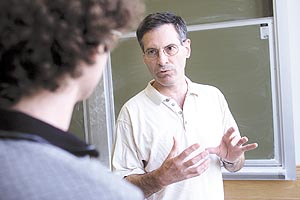Robert Kottwitz, Professor in Mathematics
By Steve KoppesNews Office
 |
“It’s a huge thrill when students start to produce their own original research,” said Kottwitz, Professor in Mathematics.
The transition from learning mathematics to producing original mathematics usually is a difficult and slow process, he said. “But eventually students become experts in their own particular area, and then, typically they have something new to tell me each time we meet. Now, that’s rewarding!”
Kottwitz made the transition himself as a graduate student at Harvard University in the mid-1970s. Two of the faculty members who helped guide him through the transition now serve as his role models.
His adviser, John Tate, had taken a large number of students under his wing at the time, but he was never too busy to answer their questions. “He certainly strongly influenced not only my mathematical interests, but also my own approach to advising graduate students,” Kottwitz said.
Another of his math professors, Phil Griffiths, always seemed to teach to a packed room, Kottwitz said. “For me his seemingly effortless teaching style remains an unattainable goal, but at least it serves as a model and an inspiration.”
Kottwitz began his teaching career in 1977 as an acting assistant professor at the University of Washington, where he had received his B.S. degree. He achieved the rank of professor at Washington before moving to Chicago in 1989.
Kottwitz professes to follow no particular philosophy of graduate education. “I just use trial-and-error and then try to stick with things that work,” he said.
His greatest challenge in teaching graduate students is adjusting to their different backgrounds, needs and expectations. “Sometimes it takes awhile to recognize those differences and take them into account while trying to build a good working relationship with a student,” he said.
Teaching advanced graduate courses especially appeals to Kottwitz. His favorites, couched in the language that only a mathematician can truly appreciate, include “Harmonic analysis on p-adic groups and Lie algebras,” and “Automorphic forms on general linear groups.”
“In an advanced course one is typically trying to present material that isn’t covered by any textbook, so the challenge is to find a coherent and understandable way to explain material scattered throughout the mathematics literature,” Kottwitz said. “I’ve had variable success with this, but the courses where this process went well are the ones I look back upon most fondly.”
![[Chronicle]](/images/small-header.gif)